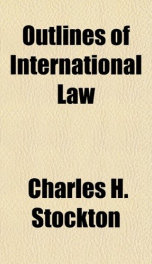outlines of international law

Purchase of this book includes free trial access to www.million-books.com where you can read more than a million books for free. This is an OCR edition with typos. Excerpt from book: English-speaking peoples displaying ready obedience to the dictates of honor, justice, and proved utility enshrined in the rules known as the law of nations, or international law." l 3. International Law to Be Distinguished from Other Named Subjects.International law, or international public law, should be distinguished from other international subjects which, though somewhat related, cover to a more or less degree different purposes. These are international private law, or the conflict of laws; international comity, or the comity of nations; international state policy, or diplomacy; and international ethics, or international morality. By defining these subjects in the following paragraphs, we will make the necessary differentiation of the subjects. 4. The Conflict of Laws, or International Private Law. International private law, or, preferably, the conflict of laws, comprises the rules and principles used in deciding cases of private rights which arise from conflicting national systems of law. These rules and principles derive their force from the municipal law and sovereignty of the state which administers them and affects individuals only. Under these rules municipal courts decide upon the jurisdiction of the case and " by what national force it is just that it should be decided." 2 In the United States the various States of the Union are regarded as sovereign from the point of view of the conflict of laws. In general, international private law relates to questions such as those of citizenship, minority, legitimacy, lunacy, the validity of foreign marriages, wills, and contracts, and to the limits of national jurisdiction in private cases. The prevailing principle is that the jural capacity of a person is determined by the law of his domicile.8 5. International Co...
Info about the book
Author:
Series:
Unknown
ISBN:
1112459863
Rating:
4/5 (5)Your rating:
0/5
Languge:
English
Users who have this book
Users who want this book
What readers are saying
What do you think? Write your own comment on this book!
write a commentGenre
if you like outlines of international law try:
Other books by this author
Do you want to read a book that interests you? It’s EASY!
Create an account and send a request for reading to other users on the Webpage of the book!

